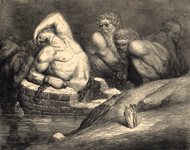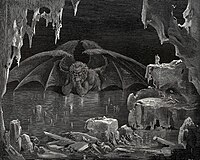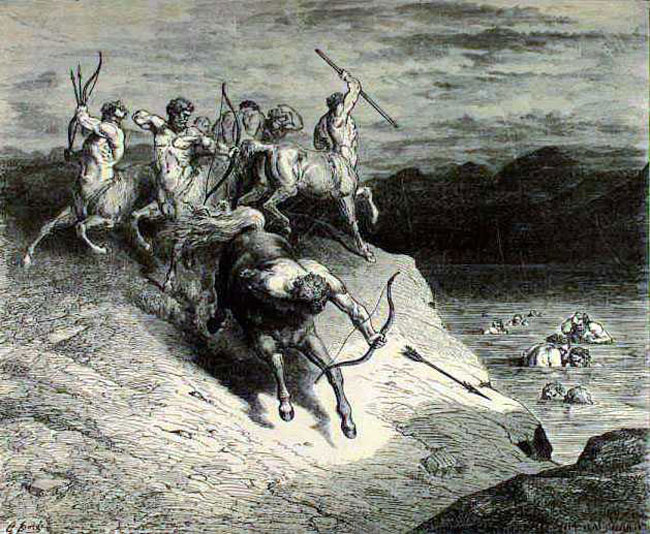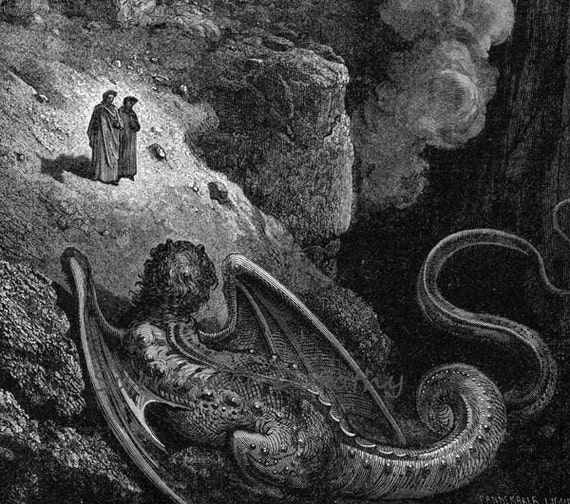Dante Alighieri writing of the his divine comedy, the Inferno, is infused with distinct ideologies that help the reader to understand the magnitude of Dante's academia. As stated by Allen Mandelbaum,
"He is seeking those gusts that will most convince us of the credibility of his journey, the accuracy of his record, the trustworthiness of his memory. 'Mistaking not' (Inf. II, 6) he would offer us evidence as undeniable as that of a historian, Livy, of whom we learn, twenty-six cantos later (Inf, XXVIII, 12), that he, too, 'does not err.' / Finally, he would convince us that his are the supreme fictions; and he would do so without contradicting his own claims to truth, because fictio for Dante does not mean 'pure invention' or 'fantastic creation' but --as Gioacchino Paprelli has shown -- a poetic composition, constructed with the concourse of rhetoric and music, or -- we should say -- prosody. And in the construction of such fictions, he is not only a strenuous emulator and intrepid pirate, but a competitor and self-announced victor" (Intro. ix-x).
A line taken from the Inferno states, "io sol uno" which means "I myself alone," this is the first instance to have a "...triple repetition of an 'I' that we have in Western writing" (Intro. xi) Dante had a fascination with learned writers that made strides in writing previous to this lifetime. In order to incorporate these techniques, Dante found ways to "talk" with these men while he narrates his personal literary piece. The two prominent writers are Virgil and Aquinas. Dante uses every human sense in order to create a world that is tangible in his writing. His best use of description is shown with his dominance of the idea of sight. In the Inferno, it has been estimated Dante uses sixty-seven instance to describe sight. The form of a journey used in Homer's,
Odyssey and Virgil's,
Aeneid helped to give Dante the basic structure of his travels. Fear is a driving force for the human mind. Dante uses this fear in order to create an intense epic that will open the mind's of his readers.
This link is a good reference that can be used throughout Dante's blog post.
The opening lines begin with the introduction of our narrator. It is never directly said but most people assume this illusive character is Dante himself. In a shadowed forest Dante meets three beast, a leopard, a lion, and a she-wolf, who block his journey towards the top of a hill that represents all that is good. After becoming discouraged Dante turns back and runs into Virgil. Dante is elated to meet his idol and ask for help to continue on his travels. Virgil agrees to help him through Hell and Purgatory in order to reach the ultimate destination of Heaven. As the duo approaches the gates of Hell, Dante finds himself questioning whether he is worthy to venture on through these mysterious lands. Virgil tells Dante of three woman in Heaven who have looked kindly upon the narrator and wish to see him through safely.
Little does Dante know that this good light that shines upon him will be his ticket through man obstacles in his travels. With these words of confidence the men continue on their path. They come to the Gate of Hell. The inscription on the gate is as follows:
"THROUGH ME THE WAY INTO THE SUFFERING CITY,
THROUGH ME THE WAY TO THE ETERNAL PAIN,
THROUGH ME THE WAY THAT RUNS AMONG THE LOST.
JUSTICE URGED ON MY HIGH ARTIFICER;
MY MAKER WAS DIVINE AUTHORITY,
THE HIGHEST WISDOM, AND THE PRIMAL LOVE.
BEFORE ME NOTHING BUT ETERNAL THINGS
WERE MADE, AND I ENDURE ETERNALLY.
ABANDON EVERY HOPE, WHO ENTER HERE" (III,1-9).
As they enter the gates Dante hears horrible cries from the souls of the dead. Virgil explains that these people are placed in the Ante-Inferno. They reside here because they never choose good or evil during their lifetime, therefore neither Hell nor Heaven can take them. They are naked and are constantly bit and stung by horseflies and wasp. The blood and tears that fall from their bodies are eaten by worms. The men approach Acheron, which is a body of water that borders Hell. Charon pilots the only vessel that crosses this water; he notices that Dante is still a living soul and tries to scare him away. Virgil reprimands Charon and tells him that woman from Heaven have ordained this journey. The captain says no more. Virgil explains to Dante that Charon's initial reaction to him is a good omen because that means our narrator is still viewed as being moral and virtuous. An earthquake disrupts their conversation and then wind/fire arise which frighten Dante into fainting.
Dante is awakened by a clap of thunder and finds himself in the First Circle of Hell, also known as Limbo. This place is reserved for those who were either never baptized or who lived before Christianity. Virgil is one of these people and resides here, when he is not helping travelers. Dante learns that the only people who made it out of Limbo were taken by Jesus Christ when he visited Hell after being crucified. He took with him Abraham, Abel, Noah, Moses, David, and Rachel to name a few. Virgil then introduces Dante to other important men that are stuck in limbo with himself. These men include Homer, Horace, Ovid, and Lucan. The men move toward a castle that houses many more souls forced to reside in Limbo.
Virgil and Dante then depart and travel onward to the second circle of Hell. This section is smaller then the first but upholds a greater punishment for all who reside there. Minos stands at the entrance and judges the sins of all who enter. However many times his tale wraps "...around himself, that marks the sinner's level" (V, 12). Minos tries to scare Dante because he recognizes that he is a living soul. Virgil steps in, once again, and tells Minos that it is ordained by the Heavens that this passage takes place. The two travel into the circle and are met by hurricane force winds. Dante learns that this area of Hell is reserved for those who have sinned out of lust. Cleopatra and Helen are two of the many sinners Virgil points out.
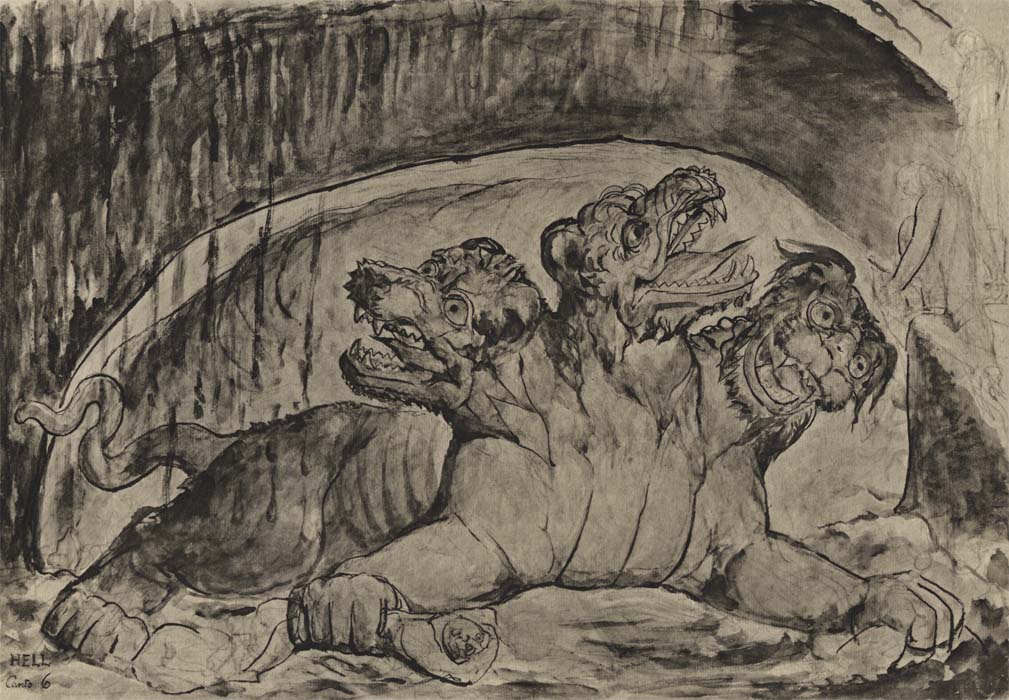 |
| Add caption |
Francesca, another lustful soul, is allowed to tell Dante her story. She was married but longed for her brother-in-law. While reading the Arthurian romance of Lancelot and Guinevere the two lovers could not hold back their lustful wants. In turn they were caught and executed. Dante ends up fainting, again, at the end of Francesca's story. As seen previously Dante awakens in the next circle of Hell. This circle torments its sinners with a filthy rain that constantly falls on them. Cerberus, a three-headed dog, inhabits the circle and is only satisfied after Virgil throws some earth at the beast. Dante and Virgil then continue past the monster and visit the gluttonous souls. Ciacco, recognizes Dante and calls out to the living man. He tells Dante how he predicts Florence will perish. Dante asks about some men from his hometown of Florence who were seen as being good. Ciacco relays to Dante that these men are in a deeper part of Hell.
As Virgil and Dante leave this circle, Dante asks his guide how punishments will change after Judgement Day. Virgil explains that these punishments will not become worse or better but that they will be perfected. The two journey onward into the fourth circle where they meet the demon, Plutus. He tries to scare away Dante but Virgil quiets the demon with simple words. In this circle two groups push weights in opposite directions until they run into each other. After turning around and pushing weights the other direction they continue until they run into each other again. This cycle is constant and this punishment is reserved for those men who squandered money. Many of them were in religious forms of leadership. Virgil then explains the influence Fortune has on those that are in this circle.
The men travel on into the fifth circle of Hell. They come across Styx, a muddy swamp. The souls that inhabit this circle are seen covered in mud and strike at each other with every part of their bodies. There are also souls that are not visible to the naked eye, that were sullen when in the sun. Now they "...are bitter in the blackened mud"(VII, 124).
The men venture further into hell and while still in the fifth circle come across a tower. They meet Phlegyas, who is persuaded to help them across the Styx by Virgil. On their journey across Dante
 |
http://www.bc.edu/bc_org/avp/
cas/ashp/dore_inferno8_argenti.htm |
recognizes one of the souls damned in the mud. Filippo Argenti tries to make peace with Dante, but the narrator wants nothing to do with the man. As the soul is drawn back into the mud Dante is happy to hear his pitiful cries. The duo continues, after arriving on the other bank, toward Dis, known as lower Hell. Those guarding the gate are appalled that a living soul has traveled this far and they refuse to let Dante enter. Virgil goes to the guards in hopes of convincing them through his divine message. He comes back defeated, but is still determined to enter into Dis. As they wait Dante becomes worried because Virgil is anxious. To pass the time Dante ask about the amount of people who make this journey. Virgil explains that not many have; however, this is his second time. As they wait, three Furies come upon the men. They are wretched creatures and call for Medusa to come and turn the living into stone. Virgil warns Dante to cover his eyes so as to avoid the Gorgon. He not only has Dante cover his eyes but, Virgil places his hands on the living's eyes in order to be cautious. Medusa arrives and goes about her business but retreats after a messenger from Heaven enters. Dante recognizes the figure and bows down in order to show respect for the being. The messenger opens the gate with ease and then journeys onward in a different direction.
Virgil and Dante enter into the sixth circle of Hell, also known as Dis. Virgil explains that the tombs that they pass by are reserved for the arch-heretics and those who followed them. The tombs are heated to different degrees thus differentiating the amount of torment. The two continue walking and Virgil explains that this particular area of Dis is reserved for those who did not believe anything happened to your soul after death. Dante is startled by a soul that begins to speak to him and knows about his basic origins based on his accent. After trying to hide behind the poet, Virgil introduces Farinata to Dante. The men begin to speak of home and learn that they were in opposing parties. Another soul interrupts the conversation and ask why his son did not make the trip with Dante. Dante's response is simple and is misinterpreted by the dead man who thinks his son no longer lives. Farinata and Dante continue their discussion and Dante soon learns that Farinata can see future events but not present ones. This fascinates Dante and he ask different questions of the soul about his beloved Florence. After being satisfied by some of the answers Dante and Virgil journey on toward their next destination. Canto X ends with Dante relaying information about the valley they approach that exudes a pungent odor.
Note: Allen Mandelbaum's translation was used for reference.


